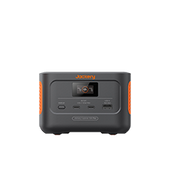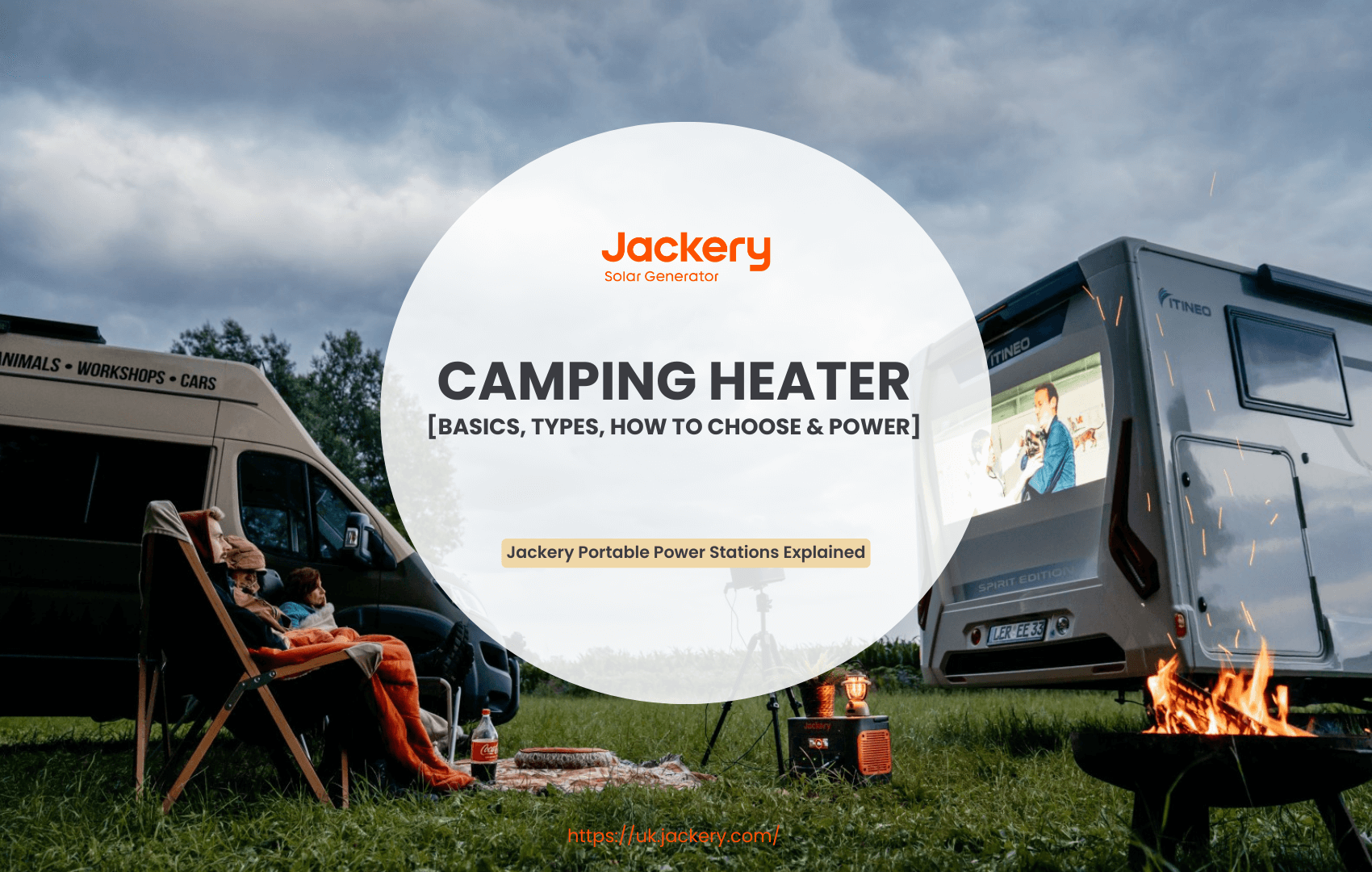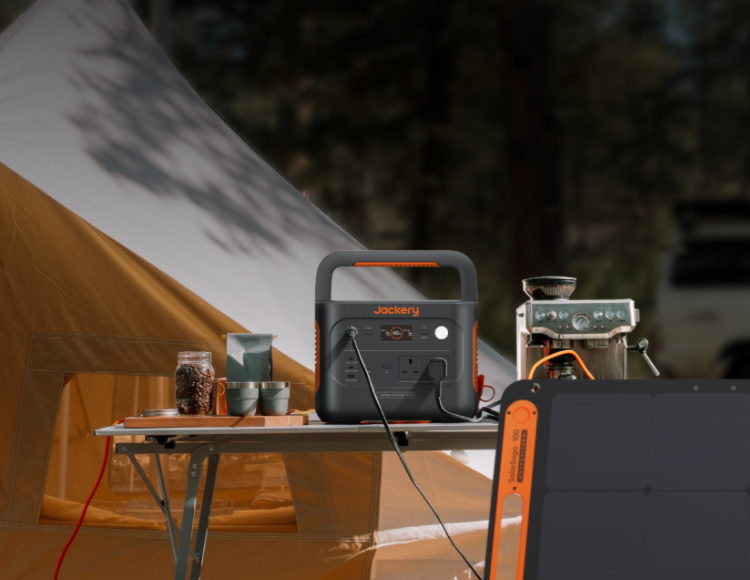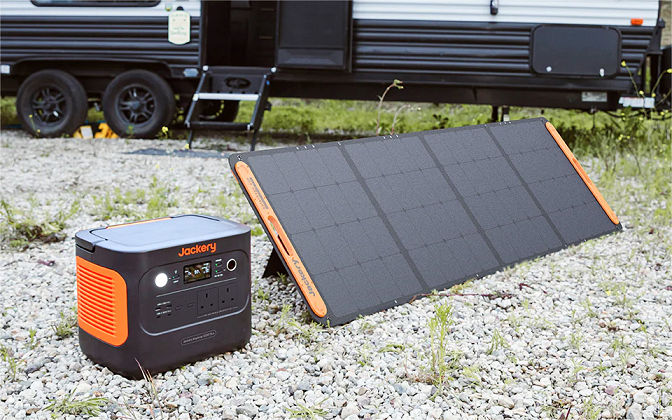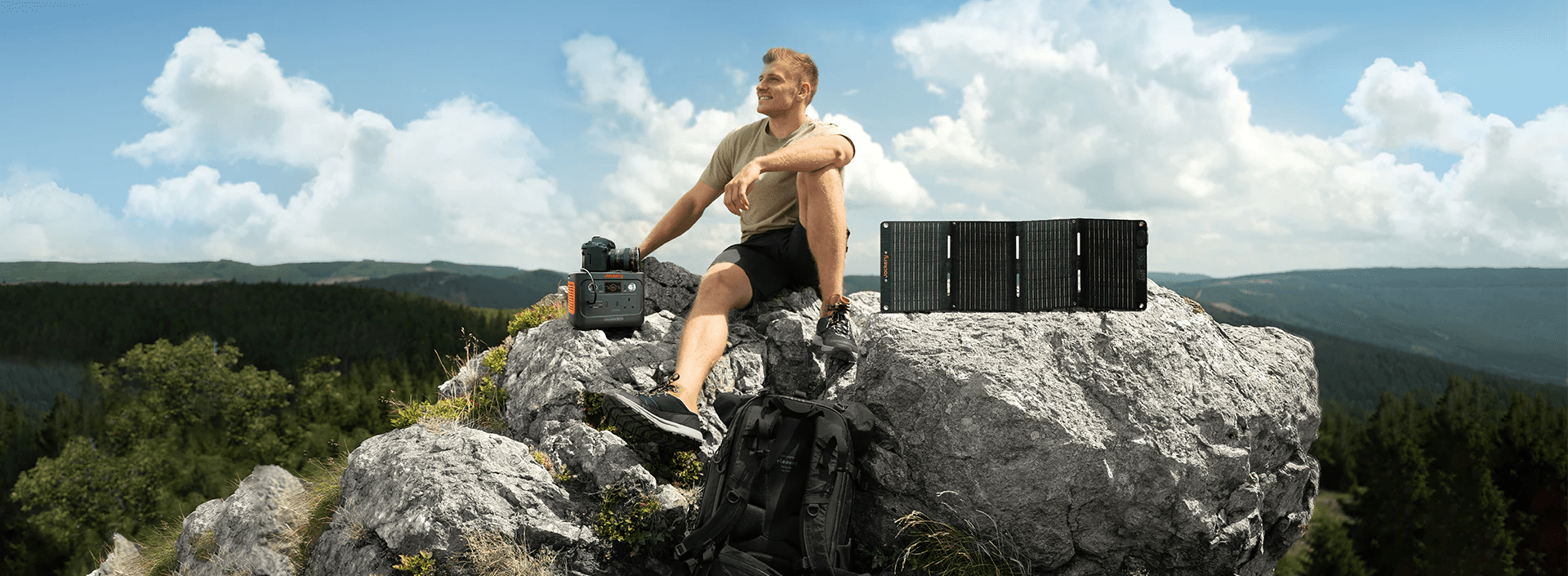Many people stop camping when winter arrives. However, winter camping can be a fantastic adventure. To stay warm, bring warm clothes, soft blankets, and a thick winter tent. If you still feel cold, choose a suitable camping heater.
For many outdoor enthusiasts, winter is a season for enjoying cooler temperatures and more outdoor activities than the crowded summer months. But these added benefits also bring obvious challenges: how to stay warm and comfortable on cold nights? A reliable camping heater can make your cold-weather camping trip more enjoyable and ensure you stay warm and comfortable on those cold nights.
This guide will analyse information about camping heaters, including things to consider when choosing one and how to use it safely. We also highly recommend Jackery Portable Power Station, ranging from 99Wh to 12 kWh, to power your camping heater effectively.
|
Key Takeaways: |
|
- Camping heaters are essential equipment for high-latitude areas, winter camping, and emergency scenarios of sudden temperature drops. - Detailed information on the most popular types of camping heaters. - A comprehensive guide to choosing the best camping heater in the UK. - The three main power supply methods for electric camping heaters. - Some tips for the safe use of camping heaters. - Analysis of several alternatives to camping heaters. - We recommend Jackery Explorer 2000 v2 or 1000 Plus portable power station to power your camping heaters and more appliances in the wild. |
Why Do You Need a Camping Heater?
Nothing is worse than being unable to sleep while camping because it's too cold. Although you can wear multiple layers of clothing, you may need extra warmth. Therefore, camping heaters play a vital role in outdoor activities. Here are the reasons why people choose to use camping heaters:
Protect Against Low Temperatures
If you camp in the open air, at high altitudes or in humid areas, the temperature may drop below freezing at night. Camping heaters can effectively increase the temperature in your tent or camper (up to 15-25℃) to prevent frostbite.
Increase Comfort and Range of Activities
Modern camping heaters can heat a local space within 3-5 minutes and provide stable energy for 8-12 hours (depending on the fuel capacity). Therefore, the warm environment of camping heaters allows you to carry out more outdoor activities and expand camping to cold seasons or extreme climate areas (snowy mountains, polar expeditions, etc.).
Replace the Risk of Traditional Fire Sources
Camping heaters (such as liquefied gas/electric types) do not have open flames, unlike campfires or wood stoves. Therefore, they can significantly reduce the fire risk during use and are unaffected by wind direction or humidity. In addition, some models of camping heaters are equipped with an automatic flameout function when tilted.
Different Types of Camping Heaters
In the UK, the choice of camping heater depends mainly on the type of fuel, heating technology, portability and the application scenario. Here is what you need to know about the most popular types of camping heaters:

Petrol Camping Heaters
A petrol camping heater uses gasoline (usually unleaded) to generate heat through combustion. It has a long battery life and is suitable for multi-day camping or frigid environments.
However, it is heavy and inconvenient to carry, and proper ventilation is required to prevent carbon monoxide accumulation. In addition, some camping sites in the UK may restrict the use of petrol equipment, so please check in advance.
Application scenarios of Petrol Camping Heaters:
• Remote area adventures
• Backyard camping parties
Propane Camping Heaters
Compact and practical propane camping heaters provide instant warmth and are ideal for car camping, tent camping, and motorhomes. They use small propane tanks commonly sold in UK supermarkets and camping stores as fuel.
However, propane requires proper ventilation due to its carbon monoxide emissions. In addition, propane's efficiency decreases in low-temperature environments, which may affect the battery life of propane camping heaters.
Application scenarios of Propane Camping Heaters:
• Short-term use in tents
• Family camping
Electric Camping Heaters
Electric camping heaters use electricity (batteries/camp power) to drive electric heating elements. Among them, it has no fuel emissions and runs quietly, making it a safe and environmentally friendly choice.
However, electric camping heaters consume more power. The camp power supply may limit some high-power models, so you will likely need to carry a power supply device to use them smoothly. Combined with the Jackery portable power station, they can work well in off-grid situations.
The following is the power consumption of electric camping heaters of standard power:
|
Watts |
Power consumption/hour |
Power consumption/day (running for 8 hours) |
|
500w |
0.5kWh |
4kWh |
|
1000w |
1kWh |
8kWh |
|
1500w |
1.5kWh |
12kWh |
|
2000w |
2kWh |
16kWh |
The data in the table is estimated based on the optimal operating state of electric camping heaters (ignoring power losses in each link) and is for reference only.
Application scenarios of Electric Camping Heaters:
• Camps equipped with power
• Hiking lightweight camping
Infrared Camping Heaters
Infrared camping heaters directly heat objects (not air) through infrared radiation. They are strong in directionality, are highly energy efficient, and can heat instantly while precisely controlling the heating area.
However, its heating range is limited, and the position must sometimes be adjusted. In addition, after long-term use, the infrared camping heaters will overheat locally.
Application scenarios of infrared camping heaters:
• Tent entrance
• Camping table area
How to Choose the Best Camping Heater?
Here is a comprehensive guide to choosing the best camping heater in the UK, covering size and weight, fuel type, heating efficiency, safety features and price factors:

Size and Weight
The size and weight of the camping heater will determine whether it is portable. For example, a camping heater with a diameter of less than 30cm is suitable for small tents (2-3 people) to avoid crowding the space.
If you are a backpacker, try to choose a compact camping heater that weighs less than 2kg.
Fuel Type
Fuel type is one of the key factors in deciding which camping heater is best for you.
Propane camping heaters require refuelling, so you need to have enough propane cylinders for your trip. Electric camping heaters are safer if you can access a reliable power source. Otherwise, you must use a Jackery portable power station to power the electric camping heater when camping off-grid.
Heating Efficiency
If it is an electric camping heater, it is recommended to choose a device with an average power of 100W per square meter (㎡). For example, a 1000W camping heater is sufficient for 10 square meters. Understand the size of the tent or camping area where you want to place the camping heater, and then choose the device that best suits your needs.
|
Area (㎡) |
Recommended Camping Heater Power (W) |
|
3 - 6 |
500 |
|
6 - 12 |
750 |
|
8 - 16 |
1000 |
|
9 - 17 |
1500 |
|
12 - 24 |
2000 |
(Data Source: ivigo) (For reference only)
Please ensure the heater is rated at no more than 2kW (2,000W); otherwise, it may trip.
Safety Features
Look for camping heaters with built-in safety features such as automatic shut-off, overheat protection, and tip-over switches.
• Tip-over automatic flameout: Prevent accidental tipping and fire.
• Overheat protection: Automatically shuts off the power when the temperature exceeds the limit.
• Low fuel alarm: Avoid dangerous fuel exhaustion.
Cost
In the UK, the prices of several popular camping heaters vary. Amazon camping heaters typically cost tens to hundreds of pounds.
|
Types of Camping Heaters |
Price |
|
Kampa Diddy Portable Heater |
from £29.95 |
|
Outdoor Revolution Eco Compact Electric Heater |
from £39.99 |
|
Outwell Katla Camping Heater |
from £49.99 |
|
Quest Bahama Dual-Purpose Oscillating Fan Heater |
from £26.99 |
|
Quest Oil Filled Radiator |
from £40 |
(Data Source: Camping and Caravanning Club)
In addition, various camping heaters will consume a lot of fuel and electricity during use. From a long-term perspective, propane camping heaters are less expensive to use. However, if you use clean electricity (such as solar energy), the cost of using an electric camping heater will be even lower.
How to Power a Camping Heater?
If you choose an electric camping heater, you must consider how to power it. In the UK, there are usually three ways to power an electric camping heater: camp power, generator, and portable power station. The following is an analysis of the three main ways to power an electric camping heater:
Site Electricity
If you want to use site electricity to power a camping heater, choose a certified campsite equipped with power (such as a CL or CSA standard campsite). With site electricity, you can directly use the electricity provided by the campsite, which is convenient and environmentally friendly without additional equipment. However, not all campsites offer power sockets, so you must confirm beforehand. In addition, some campsites in the UK charge for electricity.
In short, site electricity is suitable for short-term camping and low-heating needs.
Generator
If you choose to use a generator to power a camping heater, it can provide stable and high-power output and power multiple devices simultaneously. However, most generators are noisy and have emissions pollution, so they are prohibited in some protected areas in the UK. You must also carry fuel (gasoline/diesel) at your fire risk.
In short, a generator can power a camping heater in remote camps without power or during long-term camping trips.
Portable Power Station
Most portable power stations on the UK market are silent and zero-emission, have multiple charging methods (such as mains, car, and solar panel charging), and are light and easy to carry. However, their capacity is usually tiny, and it isn't easy to support the operation of high-power camping heaters for a long time.
Solar equipment (solar generators/panels) can power outdoor and indoor electrical appliances such as camping kettles with sufficient sunlight. Generally, solar generators are light, easy to carry, and do not take up much space.
However, the weather dramatically affects solar panel charging efficiency, and the charging effect is not good on cloudy days or at night. The Jackery Portable Power Station is a portable generator that can combine with Jackery Solar Panels as the solar generator to charge appliances with solar energy. Also, it can be recharged by wall outlets and carports when there is no sufficient sunlight, especially in the UK.
In short, portable power stations are suitable for short-term lightweight camping and areas with high environmental protection requirements to power camping heaters.
|
|
Advantages |
Disadvantages |
|
Site Electricity |
Convenient and environmentally friendly Stable supply |
Power limit Charge |
|
Generator |
Stable power Long battery life |
Emission pollution Noise Complex maintenance |
|
Portable Power Station |
Portable and quiet Easy to use Multi-purpose Multiple charging methods |
Range limit Long charging time Safety risk |
In short, please check the camping facilities in advance and book a site with a power supply for the camping heater. If you cannot use the camping power supply, please consider the environmental protection policy. If you are near the city or a nature reserve, please use a portable power station to power the camping heater. You can use a low-emission generator to power the camping heater in a remote area.

Jackery Portable Power Stations for Camping Heaters
Portable power stations are advantageous for camping heaters as they supply electricity without a power infrastructure. They can power various gadgets, including kettles, phones, cameras, etc.
A Jackery Portable Power Station is a small, battery-powered gadget that lets you get power on the go. It has AC, DC, and USB ports to run most home and outdoor appliances and smartphones. It's quieter than gas engines, doesn't emit pollution, and can be charged by solar panels, wall outlets, or car chargers.
These portable battery chargers, equipped with ChargeShield technology, safeguard gadgets against voltage fluctuations. They are engineered for outdoor resilience and feature a 94V-0 fire rating and superior shock resistance.
|
Camping Heaters |
Working Hours |
|
|
Explorer 2000 v2 |
Explorer 1000 Plus |
|
|
Small Camping Heater (500W) |
3.2H |
2-8H |
|
Medium Camping Heater (1000W) |
1.6H |
1-4H |
|
Large Camping Heater (2000W) |
0.8H |
0.5-2H |
(*The working hours are only for reference; the actual working hours depend on your usage.)
Jackery Explorer 1000 Plus
The Explorer 1000 Plus features an impressive 1264Wh durable LiFePO4 battery and a 2000W full-power pure sine wave inverter, supplying sufficient energy for camping heaters. Remarkably, it can augment its capacity to 5kWh by incorporating up to three more battery packs.
Employing Jackery's exclusive technology, the Explorer 1000 Plus's capacity can be augmented from 1.26kWh to 5kWh by adding up to three supplementary battery packs. Furthermore, it features a maximum output of 2000W, exceeding the standard 1kWh LFP power plants by 20%. It can charge a camping kettle (750W) for 1.3 hours.
The MPPT technique guarantees 99% efficiency in solar charging. A wall charge from 0% to 100% of the battery requires 100 minutes, while solar charging with four SolarSaga 200W solar panels takes 2 hours. With automobile charging capabilities, you will no longer need to worry about depleting power while outdoors.
The LiFePO4 battery system is secure and durable, equipped with a proprietary BMS (Battery Management System) that includes integrated protections. After 4,000 charge cycles, the battery retains 70% capacity, guaranteeing a lifespan of 10 years with daily charging. This yields an exceptional cycle life that is eight times longer than that of competitors.

Jackery Explorer 2000 v2
The Jackery Explorer 2000 v2 Portable Power Station has an astounding 2042Wh capacity and 2200W output, enough to power most camping equipment, such as a camping heater. It also has two AC outlets, one USB-A 18W port, and two USB-C ports (100W + 30W), so you can charge several devices simultaneously, such as camping heaters and lights.
The world's first 2kWh LiFePO4 power station, which features advanced EV-grade CTB (Cell to Body) Structure technology⁵, is engineered to be more compact and lightweight. It weighs a mere 38.6 lbs—approximately the same as a suitcase. It is the ideal power solution for off-grid living, camping, and road trips and features a foldable handle for effortless transport.
There are many ways to recharge it, including 2*SolarSaga 200W (5.5 hours), regular wall charging (1.7 hours), and car charging (24 hours). With Emergency Super Charge Mode, which can be activated through the Smart App, the power station can be charged from 0% to 80% in just 52 minutes with Emergency Super Charge Mode, which can be activated through the Smart App. This feature is ideal for situations where power is required urgently. A complete charge requires only 103 minutes in regular AC charging mode.

Safety Tips for Using a Camping Heater
Of course, cold nights while camping can make you curl up in your sleeping bag. Besides that, camping heaters can also provide you with extra warmth to help you sleep peacefully. However, basic safety is always one of the factors to consider when using any camping heater in an enclosed space or tent.
Here are some safe-use tips for camping heaters to help prevent risks such as hypoxia, fire, carbon monoxide poisoning, etc.:
Safety Tip 1: Ensure Ventilation
Propane camping heaters are strictly forbidden in enclosed tents. At least two vents (doors or windows) must be kept open.
Electric camping heaters may also cause hypoxia when used in tents for a long time, so please keep ventilation and ensure air circulation.
Safety Tip 2: Fire Isolation
Place the camping heater on a flat, stable surface, at least 1 meter away from sleeping bags, tents, or other flammable materials that may cause fire. In addition, check the ground regularly for combustible materials (dead leaves, pine needles) and clean them up in time.
Safety Tip 3: Avoid Leaving Your Camping Heater Unattended
Always leave your camping heater unattended while it is in operation. Always turn off all heating devices before going to bed, even if some camping heaters are designed to be safe to use while sleeping.
Safety Tip 4: Proper Storage Methods
Proper storage of your camping heater prevents accidental fires and prolongs its life. For example, ensure the heater is completely cooled before storing it in a dry place, as moisture may damage it over time.
Also, ensure enough space around the camping heater and avoid covering it with blankets, towels, or clothing.
Safety Tip 5: Prepare for Emergencies
Carry a fire extinguisher or sand to prepare for fires using the camping heater. You must also be familiar with fire extinguishing methods (such as the suffocation method).
If you have a headache, dizziness, or nausea, go outdoors immediately to relieve the symptoms and seek medical attention immediately.

Are There Any Alternatives to Camping Heaters?
While investing in a reliable camping heater is a great way to stay warm on a camping trip, there are other ways to beat the cold. Here's a look at a few alternatives to camping heaters:
Thick Down Sleeping Bags
Thick-down sleeping bags are usually lightweight and warm (the fillers are high in volume, such as 800+ down). They effectively reduce body heat loss and are suitable for frigid environments (below -10 °C). However, they are passively warming, relying on body temperature, and cannot be actively heated. If it is humid, the tent may get damp and lose its warmth.
In short, a thick sleeping bag is a basic warming layer that must be used with other heat sources (such as heating packs or fuel stoves).
Electric Blankets
Electric blankets heat up quickly and have controllable temperatures, making them suitable for preheating sleeping bags or tents before bed. However, they rely on power and consume more power when used for a long time. In addition, they also pose safety risks in humid environments.
In short, electric blankets are suitable for short-distance camping or winter car camping in camps with electricity or solar charging equipment.
Flexible Solar Blankets
Flexible solar blankets are thin, portable (foldable) and can be charged by solar energy. However, the weather affects their charging efficiency and cannot be used at night.
In short, flexible solar blankets are suitable as auxiliary energy sources and can be used with chemical heating packs during hiking and camping in sunny weather.
Chemical Heating Packs
Chemical heating packs are usually ready-to-use (portable and quickly warm up), and the heat generated can last for 4-8 hours. However, they are disposable items that must be appropriately disposed of after use. Some products may have a risk of leakage.
In short, chemical heating packs are suitable for emergency warmth in extremely low temperatures or local heating (such as warming the feet).
Camping Heaters FAQs
The following are the frequently asked questions about the camping heaters in the UK:
1. What is the best heater for camping?
When camping in the UK, choosing a heater requires considering safety, efficiency, portability, and environmental concerns.
Portable gas heaters are efficient and suitable for cold environments. However, they must be used with good ventilation and not in closed tents.
Electric heaters are clean and emission-free, and some models can be recharged. However, they rely on power and are suitable for car camping or campsites with power facilities.
In short, different camping heaters have advantages and disadvantages and must be selected according to their actual usage.
2. Is there a heater safe to use in a tent?
Here are some relatively safe types of heaters:
Electric heater
Catalytic heater
Infrared heater
3. How can a tent be without a heater?
A combination of methods to raise and maintain the internal temperature is used without a heater. Here are some effective strategies:
Lay a thick ground mat (foam mat, inflatable mat or thick blanket).
Use tape to seal the tent door, windows and any possible drafts.
Wear multiple layers of clothing.
Hot drinks and high-calorie foods.
Use safe disposable heating packs.
Build a campfire at a safe distance (at least 3 meters) outside the tent.
Do short, low-intensity activities before bed (such as marching in place or stretching exercises).
Final Thoughts
There are a variety of camping heaters on the market, and it can be hard to know which one is best for you. When buying a camping heater, how do you plan to use it? Will you use the camping heater for extra warmth before going to bed? The right camping heater will significantly impact the comfort and safety of any outdoor adventure, even in colder temperatures. This article explains the various types of camping heaters and how to power them off-grid. Beyond that, a camping heater isn't the only way you can stay warm while camping.











